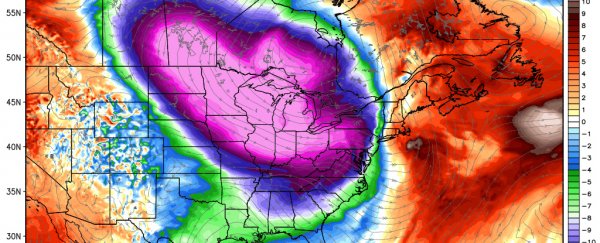The most severe outbreak of frigid arctic air in years is set to surge over the Upper Midwest and Great Lakes by the middle of next week.
A large lobe of the polar vortex, the zone of frigid air winding around the North Pole, is breaking off, and temperatures will plunge as much as 40 degrees Fahrenheit (22 degrees Celsius) below normal close to its core.
Some of this teeth-chattering cold will spill into the Mid-Atlantic and Northeast as well, but it won't be quite as extreme.
The hardest-hit zone will span from Minnesota and Iowa through Michigan, including Minneapolis, Des Moines, Green Bay, Milwaukee, Madison, Chicago, Indianapolis and Detroit.
"Wind chills … should be the coldest since the mid-1990s in parts of the eastern Dakotas, Minnesota, Iowa, Wisconsin and northern Illinois," tweeted the National Weather Service.
Wind chills will fall to dangerous levels in the Upper Midwest this week, and should be the coldest since the mid-1990s in parts of the eastern Dakotas, Minnesota, Iowa, Wisconsin and northern Illinois. Wind chills falling below -40 can cause frostbite on exposed skin in minutes. pic.twitter.com/FFVZe1xGhD
— NWS Weather Prediction Center (@NWSWPC) January 27, 2019
Frigid air has already leaked south of the Canadian border. Madison, Wisconsin's temperature sank to a record-crushing -23°F (-30°C) on Saturday, its lowest temperature in nearly 23 years.
On Sunday, International Falls, Minnesota tumbled to -46°F (-43°C), the fifth lowest temperature it has ever recorded.
Extreme cold is expected to cover a much larger area Tuesday through Thursday, sweeping southeast through Illinois and into the Ohio Valley.
"There's no mild way of saying it. Brutal cold is coming," the National Weather Service office serving Chicago tweeted. It is predicting air temperatures close to -20°F and wind chills of -35°F to -45°F Wednesday morning.
Brutally cold temperatures and potentially life threatening wind chills will be the rule across northern Illinois and northwest Indiana by midweek. During the coldest period Tuesday night thru Wednesday night, wind chills are expected to fall below -40 degrees in many locations. pic.twitter.com/ufY8U5mZCO
— NWS Chicago (@NWSChicago) January 27, 2019
Chicago's high temperature may remain below -11°F on Wednesday, which would signify its coldest afternoon in recorded history.
There is an outside chance low temperatures in the Windy City touch -20°F on consecutive days Wednesday and Thursday, which has happened only four other times in recorded history.
The Weather Service office serving Chicago is predicting temperatures will remain below zero for 60 consecutive hours, from Tuesday afternoon through Thursday.
"Only eight times since 1872 has Chicago recorded subzero highs on at least two consecutive days, the most recent being early February 1996," it said.
Milwaukee and Madison also face bone-chilling cold. In its forecast discussion for the region, the Weather Service wrote that the danger of the predicted temperatures "can't be overstated," noting they will be 30 to 40°F (17 to 22°C) below normal. "For January, that's incredible," it said.
In Des Moines, where the wind chill may dip to -40°F on Wednesday, the Weather Service is not mincing words. "THIS HAS THE POTENTIAL TO BE LIFE-THREATENING COLD AIR!!!," its forecast discussion said. "This is the coldest air many of us will have ever experienced."
It warned frostbite can occur to exposed skin within minutes under such conditions. "Make sure your heating system, pipes, etc. are as well-prepared as possible," it advised. "It may be wise to stock up on groceries between now and Monday evening so outdoor time is minimized."
The low temperature in Minneapolis may fall to near -25°F Wednesday and Thursday mornings while wind chills could plummet to -50°F (-46°C). "There's no sugarcoating it, the weather will get extremely cold," tweeted the Weather Service office serving the Twin Cities.
Parts of northern Minnesota may see air temperatures below -30°F and wind chills of -55 to -60°F (-61°C).
Wind chills may plunge to -30°F around Detroit on Wednesday and Thursday mornings, and "frostbite and hypothermia may become serious concerns," the Weather Service serving the Motor City tweeted.
The cold wave, which should begin to wane Friday into the weekend, is likely to set numerous records. Many locations are predicted to challenge their coldest high temperatures for January 30 on Wednesday, and a number of record lows may be set Wednesday and Thursday mornings.
The entirety of Minnesota and Wisconsin and much of northern Illinois is expected to remain below zero for all of Wednesday.
"This is a bonafide arctic airmass," tweeted Sam Lillo, a meteorology researcher at the University of Oklahoma, noting temperatures at high altitudes may rival the coldest ever recorded in the contiguous United States.
Some of the cold from this arctic blast will reach the Mid-Atlantic and Northeast, but its intensity is likely to ease as it nears the coast - with the more extreme conditions in the interior.
Temperatures may fall 10 to 25°F (5 to 13°C) below normal Wednesday through Friday but probably won't be record-breaking.
2018 © The Washington Post
This article was originally published by The Washington Post.
